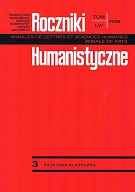Physis w myśli historycznej Tukidydesa
Physis in Thucydides’ Historical Thought
Author(s): Paweł SzarekSubject(s): Language and Literature Studies
Published by: Towarzystwo Naukowe KUL & Katolicki Uniwersytet Lubelski Jana Pawła II
Keywords: Greek historiography from the 5th century BC; Thucydides; the Peloponesian war; philosophy of history; the first Sophistics; Protagoras; Gorgias; physis; arete; law of nature; human nature; historiografia grecka V wieku przed Chr.; Tukidydes
Summary/Abstract: This paper seeks to determine the meaning and narrative function of the concept of φύσις in Thucydides’ work. Our interpretation of his text is based on Heinrich Patzer’s semantic analysis, one that distinguishes three connotative categories: outlook, being of itself, and the manner of behaviour. This research procedure is supposed to qualify the concept under study to a respective connotative group by determining its semantic value. In the category “being of itself,” φύσις has been used to denote inborn oral values, such that are manifested in action and are passed on through inheritance. They are linked with the inborn traits of intellect, a fact that makes it possible to control external circumstances. In the meaning of a genius, an innate talent, the historian pays attention to the role of the individual’s mental skills in the historical process and confers on them a causative function in historical changes. In the meaning a “true character” reveals its motivation; it is stated that nature determines human action, and is a necessary factor in history, such that is being revealed in deeds. The historian indicates also the qualitative inequality of intellectual predisposition: innate mental skills allow us to recognise situation and action free from error, whereas a weaker intellectual constitution evokes the force of human passion. In the extraordinary natural predisposition that is distinguished in a community, φύσις has a myth-making function. The historian uses this concept in his justification of the meaning of eminent historical figures, and it is the basic component of the historiographic creation of heroes. Φύσις functions in this case as the archetype of a hero “integrator,” i.e., it is an individual that composes the prototype of a hero in a historiographic construction on the basis of concrete, always repetitive and intellectual inborn traits.
Journal: Roczniki Humanistyczne
- Issue Year: 56/2008
- Issue No: 03
- Page Range: 5-52
- Page Count: 48
- Language: Polish

